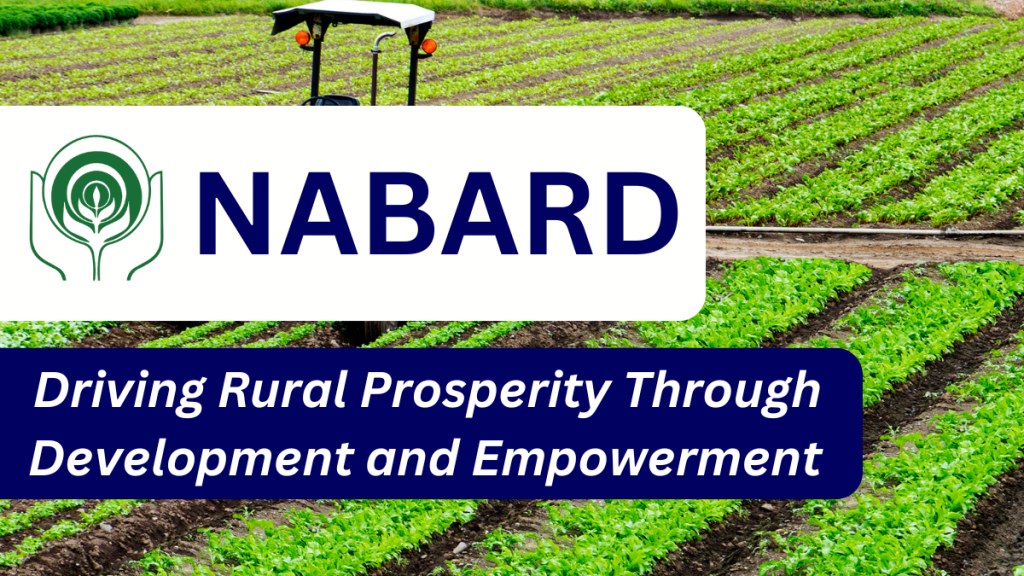Rural development is the backbone of India’s economic growth because the majority of our population still resides in rural areas. The National Bank for Agriculture and Rural Development or NABARD, is tasked with improving the quality of life in rural areas and ensuring that rural residents have ample opportunities to thrive and grow their communities.
NABARD was set up in the year 1982, with a mission to promote sustainable and equitable agriculture and to foster rural development. It has evolved over the decades as an important institution actively bridging the aspirations of rural India with the ground realities by providing them with financial, institutional, and technical support. This is a blog on how NABARD and the policies it has implemented have helped it become a mainstay in transforming rural India and taking its development to the grassroots, empowering communities toward self-sufficiency and resiliency.

Why Focus on Rural Development?
There is a strong need from the sociological, economic, political, and humanitarian dimensions to focus on rural development and prosperity in India. More than 65% of the Indian population dwells in rural areas. If it is given the least priority, then sociologically, the gap between the urban and rural population will become much broader than it has been, leading to social fragmentation and tension.
Rural India is rich in cultural heritage and human capital, but the poor infrastructure, and a lack of education, and healthcare have often allowed this potential to remain untapped. A commitment to rural development can result in India moving toward creating a society that is more equitable where all citizens, regardless of their geographic location, have access to opportunities and resources which in turn will foster social cohesion and stability.
Economically, agriculture remains the backbone of India, as the majority of rural populations derive their livelihoods from it. The agricultural sector contributes immensely to the country’s GDP and is further vital for food security. But without proper development, attention to farmer needs, supporting infrastructure and other resources, stagnation will result in the sector, which can turn into economic instability.
Improvement in agricultural productivity and practice through adopting sustainable methods will lead to rural development—fueling economic growth while ensuring an economy that can be relied on. Moreover, with improved infrastructure and increased rural incomes, new markets for rural goods and services are created, increasing demand and boosting national economic growth. This kind of balanced growth will also ensure that the benefits from economic growth are shared all over the country and not merely concentrated in some urban areas.
The political advantages of rural development are equally significant for national unity and political stability. Developmental regional disparities can lead to discontent and sometimes insurgency. This will also reduce regional disparities and focus on national integration and political stability. Besides, rural development is in conformity with the principles of inclusive growth, wherein every citizen has a stake in the country’s progress, irrespective of his/her/their location. This inclusiveness is necessary for democratic governance to sustain and for people to repose faith in political institutions.
The humanitarian argument for focusing on rural development is no less strong. Rural India stands almost as a synonym for higher poverty, limited education and health facilities, and varied issues over the marginalization of vulnerable communities. It is an imbalance that must be redressed by putting special development efforts into action. Better living conditions in rural areas not only reduce poverty but also empower the marginalized communities to have a better life. This is the very basic foundation of bringing in social justice and making every citizen live with dignity.
Dedicated policies on Indian rural sector development can also help sharpen our country’s international competitiveness. A thriving rural sector can lead to significantly more agricultural exports and reinforce India’s claim to being a leading competitor in the international market. Investment in rural development can increase productivity and quality of produce. The focus on rural development is to emphasize innovation in agriculture and rural industries. By incorporating modern technology, India would be able to increase efficiency and productivity, hence competition on the global stage.
Furthermore, the fast-track migration into towns and cities due to the lack of opportunities in rural areas, puts a strain on urban infrastructure, thus leading to the overcrowding of cities and proliferation of slums. If rural areas were to be developed and opportunities made available at home, this would reduce migration and, therefore, ensure a more balanced urban-rural demographic. Moreover, rural communities are custodians of India’s cultural heritage, traditional knowledge, and sustainable living practices. In a similar vein, the preservation and integration of these practices into modern models of development ensure that progress does not have to be made at the expense of cultural and environmental degradation.
How does NABARD Reinforce Rural Development?
NABARD, the National Bank for Agriculture and Rural Development, has been a cornerstone in the development and transformation of India’s rural sector since its establishment in 1982. As the apex financial institution responsible for promoting sustainable and equitable agriculture and rural development, NABARD has implemented a wide range of schemes and initiatives that have significantly impacted rural communities across the country. These schemes have been designed to address various aspects of rural life, from financial inclusion and agricultural productivity to infrastructure development and skill enhancement.
Credit Support and Financial Inclusion
One of NABARD’s core objectives is to enhance financial inclusion in rural areas, and this has been achieved through several impactful schemes. The Self-Help Group (SHG)-Bank Linkage Programme (SHG-BLP), launched by NABARD, is a prime example. This scheme aims to provide financial services to unattended and underserved poor households through the SHG model. The SHG-BLP has become the world’s largest microfinance program, covering almost 16.19 crore households in India. Over 80% of these groups are exclusively women-led, thereby not only improving access to credit but also significantly empowering rural women. The program has enabled women to take loans at reasonable interest rates, start small businesses, and improve their families’ economic conditions, leading to greater financial independence and enhanced social status.
To further support the SHG movement, NABARD has implemented Skill Development Programmes for SHGs. These programs provide need-based skill development training to mature SHGs, enhancing their income and employability. As of now, 6.12 lakh SHG members have been trained through 20,822 Micro Enterprise Development Programmes (MEDPs). By leveraging the SHG platform for imparting skills, NABARD has facilitated access to credit, promoted livelihoods, and enabled members to undertake income-generating activities, contributing to the economic upliftment of rural communities.
NABARD’s Refinance Schemes for Banks have also played a crucial role in boosting bank credit to SHGs, Joint Liability Groups (JLGs), and Micro Finance Institutions (MFIs). By providing refinance to banks, NABARD ensures that these financial institutions have sufficient liquidity to extend loans to rural borrowers. During 2023-24, NABARD extended refinance of ₹10,099.55 crore to banks, with cumulative refinance disbursement for SHG lending standing at ₹1,17,895.32 crore as of March 31, 2024. This infusion of credit has enabled rural enterprises to grow, thereby creating jobs and stimulating economic activity in rural areas.
In response to the challenges posed by the COVID-19 pandemic, NABARD introduced Special Refinance Schemes for Post-COVID Recovery. These schemes were designed to address the issue of rural migration and boost the agriculture and rural sector in the post-pandemic era. The schemes provided concessional credit to eligible financial institutions for activities such as micro food processing enterprises, water, sanitation, and hygiene (WASH) projects. By supporting these essential activities, NABARD helped stabilize rural economies and provided much-needed relief to communities affected by the pandemic.
Rural Infrastructure Development
NABARD’s Rural Infrastructure Development Fund (RIDF) has been instrumental in financing the construction of essential rural infrastructure, including roads, bridges, irrigation systems, and rural electrification. The RIDF was established to bridge the gap in rural infrastructure, which is critical for improving connectivity, access to markets, and the overall quality of life in rural areas. For example, by funding irrigation projects, NABARD has increased the availability of water for agriculture, leading to higher crop yields and improved food security. Similarly, the construction of rural roads under RIDF has enhanced access to markets, allowing farmers to sell their produce at better prices and reducing transportation costs. These infrastructure projects have had a multiplier effect on rural economies, creating jobs, and boosting economic activity.
In a significant move to strengthen the cooperative credit structure, NABARD has embarked on the Transformation of Primary Agricultural Credit Societies (PACS) into Multi-Service Centres. This initiative, launched in 2020-21, aims to develop PACS into Multi-Service Centres over three years by providing concessional refinance to State Cooperative Banks (StCBs). NABARD has earmarked ₹5,000 crore for this purpose, with the goal of transforming 35,000 PACS into entities capable of offering a range of services beyond credit, such as input supply, marketing, and storage. This transformation is expected to enhance the role of PACS in rural development, making them more responsive to the needs of farmers and rural communities.
Agricultural Development and Innovation
NABARD has been at the forefront of promoting sustainable agricultural practices and innovation in farming. Through its Farm Sector Promotion Fund (FSPF), NABARD supports projects that promote sustainable and climate-resilient agriculture, such as organic farming, integrated pest management, and watershed development. These initiatives have helped farmers adopt environmentally friendly practices that improve soil health, conserve water, and increase crop yields. By funding agricultural research and development, NABARD has facilitated the transfer of knowledge and technology to the grassroots level, helping farmers improve their productivity and income.
Skill Development and Capacity Building
Recognizing the importance of human capital in rural development, NABARD has implemented various programs focused on skill development and capacity building. The Skill Development and Employment Generation Fund (SDEF), for instance, has provided training to rural youth in a range of skills, from modern farming techniques to entrepreneurship and vocational skills. These training programs have equipped rural individuals with the skills needed to start their businesses, secure better-paying jobs, and contribute to the rural economy. By fostering entrepreneurship, NABARD has helped create a culture of self-reliance in rural communities, reducing dependence on agriculture and promoting the diversification of rural incomes.
Natural Resource Management and Environmental Sustainability
NABARD has been a strong advocate for natural resource management, recognizing that sustainable development in rural areas depends on the careful management of natural resources. The Watershed Development Program is one of NABARD’s flagship initiatives in this area. By promoting watershed management, NABARD has helped rejuvenate degraded lands, improve water availability, and enhance agricultural productivity in drought-prone areas. Similarly, NABARD’s Tribal Development Fund (TDF) focuses on the sustainable development of tribal communities by promoting agroforestry, horticulture, and other sustainable practices that improve livelihoods while conserving the environment. These programs have had a significant impact on the ecological and economic resilience of rural communities, particularly in environmentally fragile regions.
Support for Rural Enterprises and Microfinance
In addition to agricultural development, NABARD has supported the growth of rural enterprises and microfinance institutions. By providing refinance support to rural banks and microfinance institutions, NABARD has facilitated the growth of small and medium enterprises (SMEs) in rural areas. These enterprises provide essential services, create jobs, and contribute to the overall economic development of rural communities. NABARD’s efforts in promoting rural entrepreneurship have been further strengthened by its support for the Rural Innovation Fund (RIF), which finances innovative projects that have the potential to improve rural livelihoods. By encouraging innovation and entrepreneurship, NABARD has helped diversify rural economies, making them less dependent on agriculture and more resilient to economic shocks.
Post-Harvest Management and Market Access
NABARD has also focused on improving post-harvest management and enhancing market access for farmers. Through initiatives like the Warehouse Infrastructure Fund (WIF), NABARD has supported the construction of warehouses and cold storage facilities, helping farmers reduce post-harvest losses and store their produce until they can get better prices in the market. Furthermore, NABARD’s support for Farmer Producer Organizations (FPOs) has empowered farmers to collectively market their produce, negotiate better prices, and access bulk inputs at lower costs. These initiatives have improved the bargaining power of small farmers and enhanced their income, contributing to the overall prosperity of rural communities.
Career in NABARD
A career in NABARD is of high repute since it offers one the unique opportunity to be a part of rural development and agricultural prosperity in the country. With NABARD you get the opportunity to work at the primary institution for shaping the rural economy of India and, therefore, placing yourself at the threshold of impactful initiatives changing many lives across rural communities. With the NABARD Grade A exam and NABARD Grade B exam drawing close, ixamBee is excited to help aspiring NABARD candidates prepare for the upcoming NABARD selection exam. ixamBee offers a vast array of NABARD preparation resources like our NABARD Grade A Phase 1 and 2 course, online test series for NABARD exams, NABARD Grade B mock test series, and NABARD previous year papers.
Conclusion
The policies and programs of NABARD have had a cumulative transforming effect on rural communities in terms of financial support, building infrastructure, sustainable agriculture practices, and empowering rural people through skill development and entrepreneurship, all of which have changed the quality of life in rural India. Innumerable farmers have benefited through improved access to credit, better infrastructure, and farming practices. Women in rural areas have been empowered through microfinance and self-help groups; it has enhanced gender equality and economic independence. With India continuing to change at various levels, the role of NABARD can only become more important in making this rural sector more equitable and prosperous.
To help you prepare 50% faster for competitive exams, ixamBee provides free Mock Test Series and all the Current Affairs in English and Current Affairs in Hindi in the BeePedia capsules for GA Preparation. You can also get the latest updates for Bank PO, Bank Clerk, SSC, RBI Grade B, NABARD, and Other Government Jobs.
Also read:
Cracking NABARD Grade A Exam: Tips and Preparation Strategies
Code Cracked: How should working aspirants prepare for the NABARD Grade A examination?
NABARD Development Assistant vs. RBI Assistant: Everything to Know















